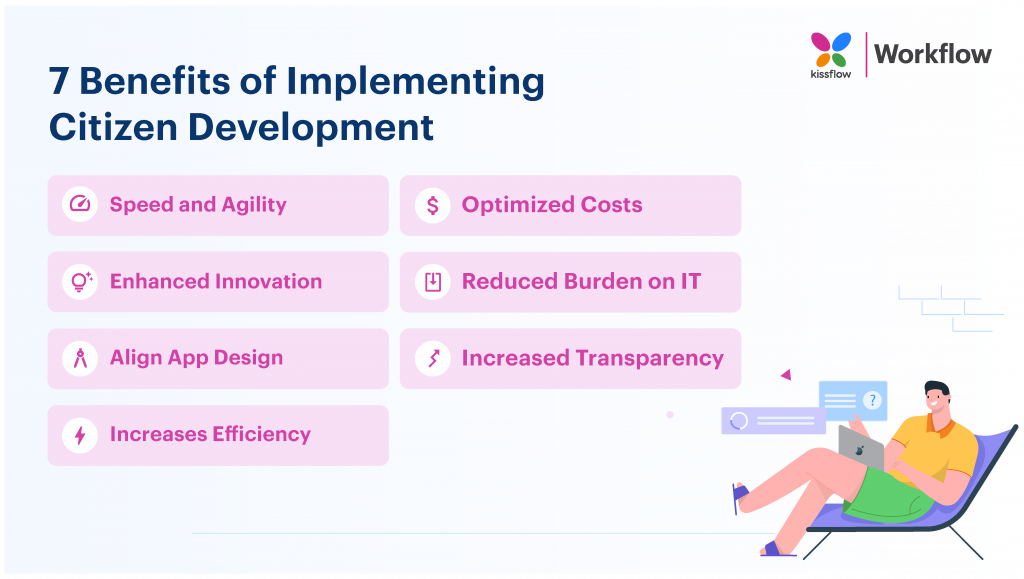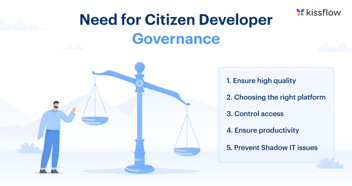.webp?width=500&height=300&name=7-Benefits-of-Implementing-Citizen-Development-01-1024x579%20(1).webp)
- >
- Citizen Development >
- 7 Benefits of Implementing Citizen Development
7 Benefits of Implementing Citizen Development
Team Kissflow
Updated on 23 Apr 2025 • 5 min read
The wave of digital transformation has profoundly redefined the business landscape, escalating the demand for software solutions. However, there's a bottleneck - the scarcity of software developers needed to drive these numerous digital initiatives. This is where the concept of citizen development comes into play.
Citizen development is an innovative framework that empowers businesses to streamline processes and automate workflows without the constant involvement of the IT team. It enables non-IT employees to create business applications using IT-approved low-code/no-code platforms.
This approach not only democratizes software development but also alleviates the pressure on IT departments, often besieged with demands. It allows business users to contribute actively to application development, ensuring their needs are met in a timely manner.
As a CIO or a business transformation professional, embracing citizen development means fostering a culture of innovation and collaboration. It's about leveraging the collective expertise within your organization to deliver solutions faster and more efficiently.
Why are companies adopting citizen development?
No-code platforms empower citizen developers to safely improve business processes. An organization with a good citizen development program has happier employees and more efficient operations, enabling the IT team to focus on more critical projects.
7 benefits of implementing citizen development in your company

Below are the top benefits of citizen development:
- Speed and Agility
- Enhanced Innovation
- Align App Design with User Needs
- Increased Efficiency
- Optimized Costs
- Reduced Burden on IT teams
- Increased Transparency
1. Speed and Agility
Gone are those days when app development took months. Thanks to citizen development. Now, non-IT employees can build enterprise-grade apps easily, using drag-and-drop interfaces, and automate workflows without bottlenecks. Citizen developers can help a company to adapt quickly to overcome challenges or meet new demands.
Learn more: How does Citizen Development Enhance Business Agility
2. Enhanced Innovation
Citizen development programs drive innovation while upskilling employees. IT teams are often overwhelmed and are busy building critical solutions and maintaining existing systems. No-code and low-code tools enable citizen developers to meet organizational needs, inspire them to innovate, and help design new apps with ease.
3. Align App Design with User Needs
In most organizations, IT teams have limited resources and are unable to meet the demand for new apps. Citizen developers are experts in their field and know what data to collect and how to use it. They can easily build business-critical apps and take some pressure off the IT team.
Learn more: Citizen Developer Apps are the future of App Development. Here's Why.
4. Increased Efficiency
Empowering business users to design applications increases their job satisfaction. Even remote workers can take part in the citizen development program. 1,650 companies that adopted citizen development saved 1.6 hours per week in 3 years. Improved efficiency and agility give a company a competitive advantage. Based on our most recent survey data, 87%[1] of enterprise developers use low-code development platforms for at least some of their development work.
5. Optimized Costs
A no-code citizen development platform allows citizen developers to create applications in less time and with less money. Organizations can optimize existing resources and employees, significantly reducing expenses. Developing more apps in-house eliminates the need to outsource work or purchase third-party applications.
6. Reduced Burden on IT
IT teams have enough on their plate- troubleshoot existing apps, create new apps, and focus on digital transformation. Citizen development allows IT to focus on more complex projects. When your IT team isn’t overwhelmed, it becomes easy to monitor the risks and rewards of citizen development and to provide permissions for apps to be built.
Learn more: How Citizen Development Unites Business and IT
7. Increased Transparency
Citizen development streamlines the app development process by empowering skilled employees to build their own solutions. This way, redundancies and shadow IT are eliminated to a great extent. Organizational transparency is also enhanced by enabling sharing of tools and resources.

The No-Code Approach to Unlock Citizen Development Excellence
Thank you for downloading!
Reasons why companies are investing in citizen development
“Citizen developers employing low-code and no-code have the potential to be the talent shortage's saving grace. Alongside the booming of low-code and no-code platforms and citizen developers, IT departments have been freed up from a resource perspective, allowing them to evolve beyond cost centers and into more proactive implementers of technology, overseeing policy, compliance and identifying new business opportunities and streams of revenue." - Stanley Huang, co-founder and CTO at Moxo.
Simplifies business processes
Be it a linear process or a complex one, organizations always seek a simple way to handle them. Citizen development helps streamline processes, brings fluidity to the workplace, and builds strong communication across all departments.
Learn more: What is a citizen integrator?
Fast-tracks digital transformation
Market conditions are constantly changing, and organizations look for a roadmap to release products and services quickly. A citizen development model can help a company to speed up product development and enhance better service delivery.
Learn more: How Does Citizen Development Facilitate Digital Transformation?
Supplements insufficient developers
More businesses are leveraging their non-technical workforce and upskilling them to minimize the load on IT. With the right tools, citizen developers can develop essential business apps faster, eliminate bottlenecks, and improve process efficiency.
Learn more: Citizen Developer vs Professional Developer
Improves business & IT productivity
With the right low-code/no-code platform, citizen developers can align business and IT. They build the apps they need without relying on IT. This way, the IT backlogs are greatly reduced, and the cost is optimized, boosting the organization’s overall productivity.
Learn more: How Low Code Apps Empower Citizen Developers
How citizen development enhances employee autonomy
Citizen development enables employees to create applications and automate workflows without relying on IT, fostering a culture of innovation and self-sufficiency. By equipping process owners with no-code tools, organizations can reduce IT backlogs and improve operational agility .
Faster problem-solving: Employees closest to a process can quickly build and refine solutions tailored to their needs, eliminating long wait times for IT development.
Increased productivity: With intuitive, no-code platforms, teams can automate repetitive tasks, allowing employees to focus on high-value work.
Better alignment between business and IT: A well-governed citizen development program ensures business users can build solutions while IT maintains oversight on security, compliance, and integrations
How McDermott improved their process efficiency?
McDermott, a leading engineering and construction solutions provider, faced significant challenges with an overburdened IT team supporting 6,000 business users and a complex application landscape. Furthermore, a lack of an ERP system led to numerous discrete applications, complicating workflows.
Renee Villarreal, the Senior Director of IT, sought a solution that would allow business users to build their own applications and streamline operations independently. The tool needed to be user-friendly, secure, and integrate well with existing systems like SharePoint.
Kissflow emerged as the perfect fit, offering intuitive, straightforward functionality that empowered users to handle their workflows without IT support. This ease of use led to widespread adoption across the organization, even without a formal campaign. Kissflow's mobile application was another advantage, providing quick accessibility for users.
The platform proved particularly beneficial for the HR team, who could quickly build applications and streamline various workflows. It also enabled business users to identify and resolve bottlenecks in their processes.
Within a year, McDermott processed over 23,000 work items, had 5,526 active users, and created 132 active workflows without relying on IT. The company now plans to standardize all workflows across its offices using Kissflow.
Kissflow helps you empower citizen developers
IT departments across numerous businesses often find themselves in a constant state of flux, grappling with an ever-growing backlog and an incessant influx of new solution requests. This is where the concept of citizen developers offers a beacon of hope. By empowering these individuals, companies can address both budgetary constraints and staffing challenges, with the right no-code platform serving as their launchpad.
Kissflow's low-code platform exemplifies this solution. Designed for user-friendliness, it can swiftly transform business users into proficient citizen developers. Its visually intuitive drag-and-drop form builder, coupled with a suite of pre-built templates, enables users to streamline workflows and build tailored business applications with minimal coding.
While Kissflow empowers business users to independently construct applications, it ensures that IT retains control over data governance. This guarantees robust security and compliance, providing peace of mind amid the drive for innovation.
Join the Citizen Development Movement and Build Your Own Solutions!
Related Articles










